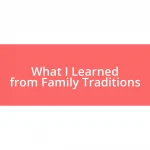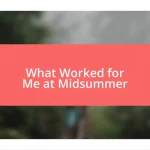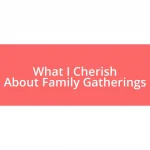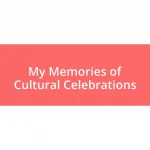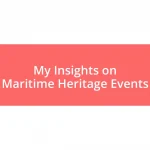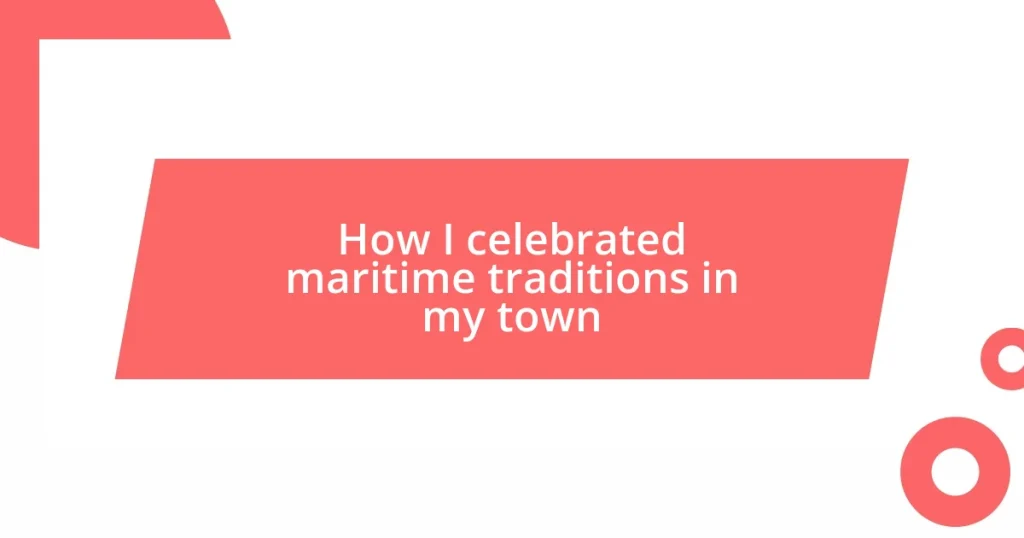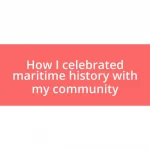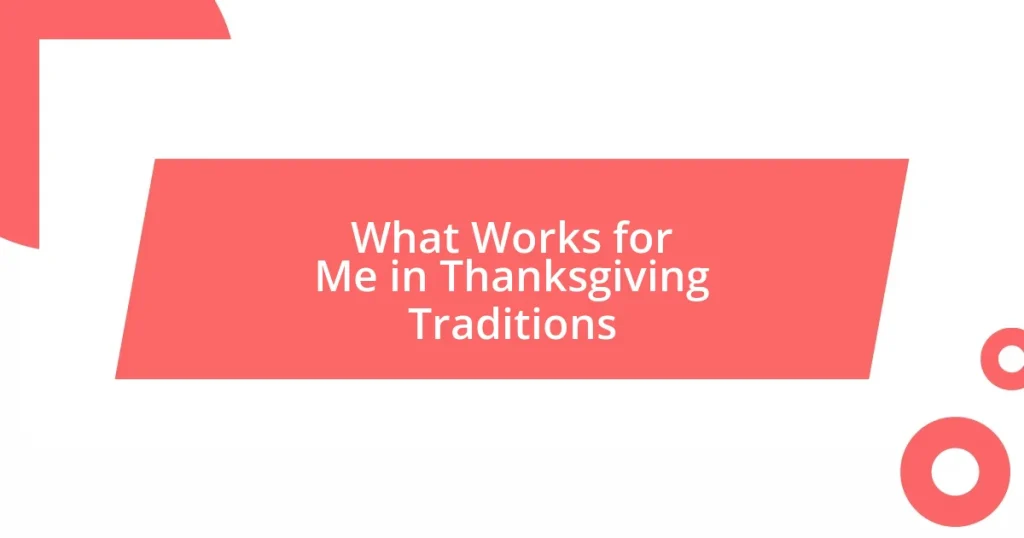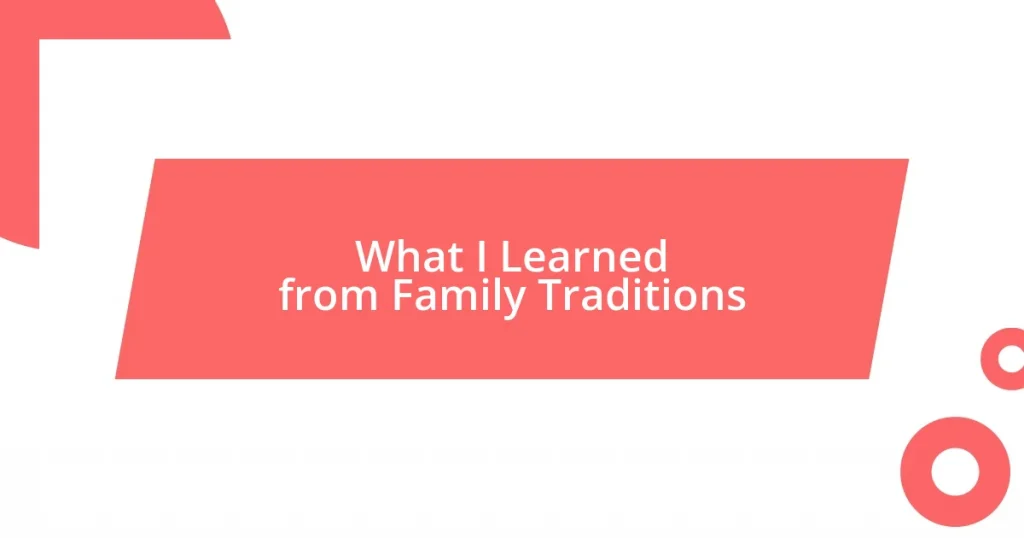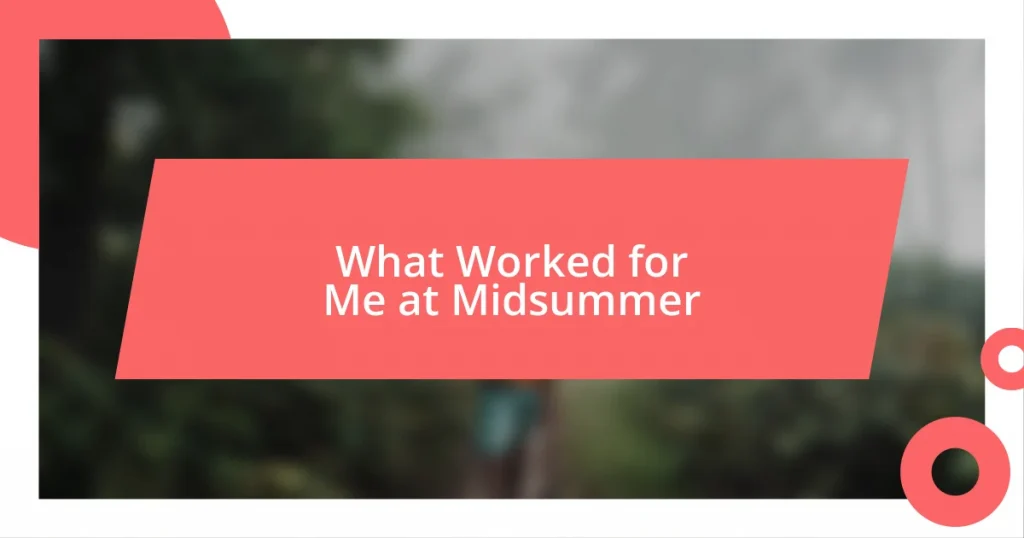Key takeaways:
- Maritime traditions serve as cultural touchstones, fostering community bonds and a sense of identity through shared events like the Blessing of the Fleet and local festivals.
- Participating in activities such as lantern releases and boat-building workshops deepens connections between generations and enhances appreciation for coastal heritage.
- Cultural influences shape maritime practices, as seen in diverse cooking traditions and traditional navigation techniques, highlighting the community’s rich, multifaceted history.
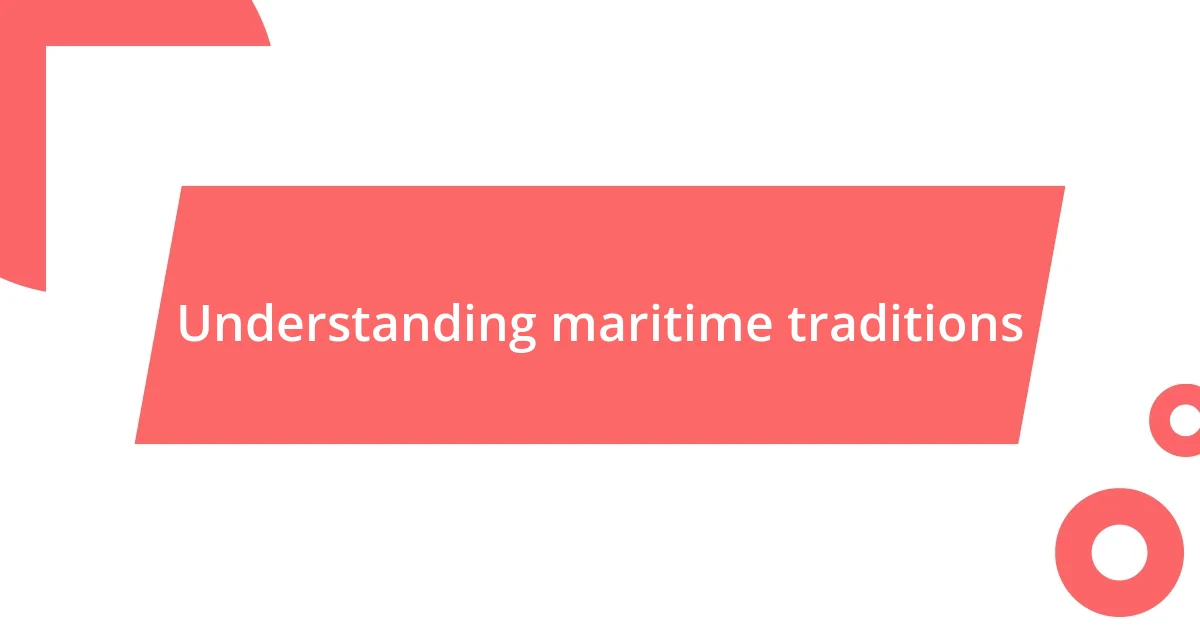
Understanding maritime traditions
Maritime traditions are not just historical practices; they weave the very fabric of coastal community life. Reflecting on my own experiences, I’ve often wondered how these traditions shape our identities. For instance, the annual boat parade in my town is more than just a display – it’s a heartfelt homage to our seafaring past and an opportunity for generations to bond over shared stories.
Many of these traditions stem from centuries-old customs, from fishing techniques to ceremonial sailing. I recall attending a local festival where craftspeople demonstrated their skills in boat building, sparking not only my curiosity but also an emotional connection to the land and sea. It’s riveting to think how each handcrafted vessel carries stories of those who came before us, don’t you agree?
The way communities come together to celebrate these maritime legacies can be truly uplifting. I remember standing on the shore during a traditional blessing of the fleet, feeling the palpable sense of gratitude and hope. There’s something profoundly unifying about witnessing our collective respect for the ocean and the lifeblood it has provided – it reminds me that we are all part of something greater than ourselves.
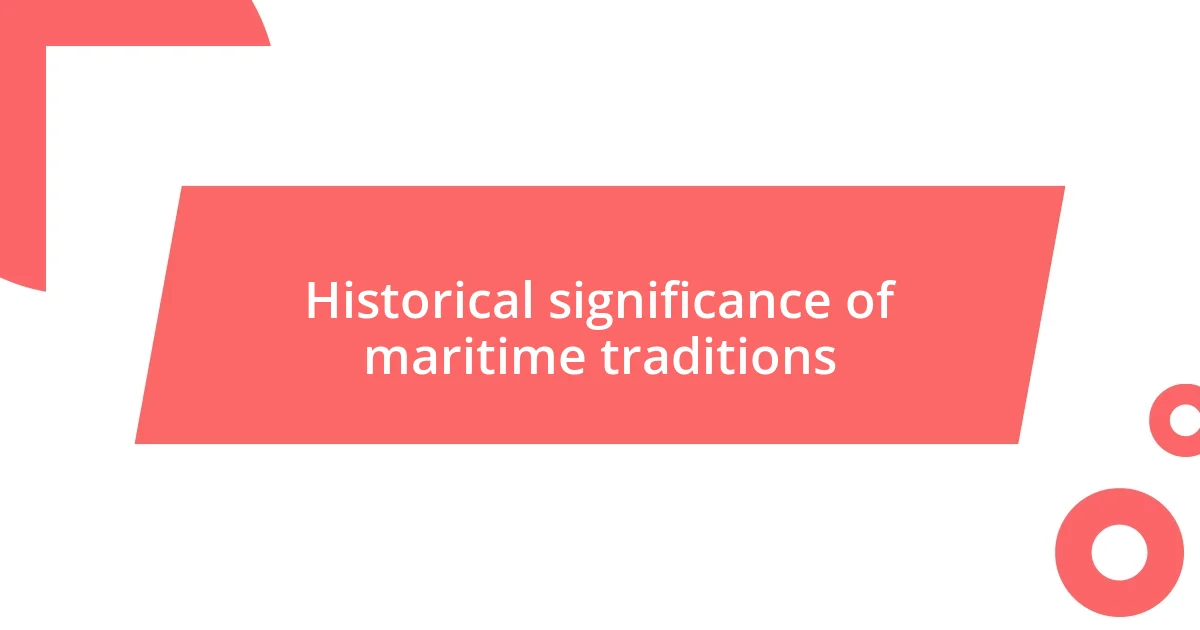
Historical significance of maritime traditions
Understanding the historical significance of maritime traditions invites a deeper appreciation for our coastal heritage. Growing up near the sea, I noticed how these practices anchored our community’s identity, connecting us to the past. Every piece of folklore or practice passed down tells a story of survival and innovation, reminding us of how our ancestors faced the challenges of the sea.
- Maritime traditions serve as cultural touchstones that celebrate the maritime skills, like navigation and boat-building, handed down through generations.
- Festivals and rituals, like the Blessing of the Fleet, not only commemorate past seafarers but instill a sense of pride and continuity within the community.
- The intricacies of fishing prowess and seasonal gatherings resonate deeply; it’s as if each tradition echoes the heartbeat of our coastal existence.
While attending a local seafood festival, I felt a wave of nostalgia as families shared tales of their fishing exploits—each story painting a vivid picture of lengths taken and waves braved. This sense of belonging was palpable, demonstrating that these traditions do more than just commemorate history; they create lasting bonds among us, fostering an ongoing dialogue with our maritime roots.
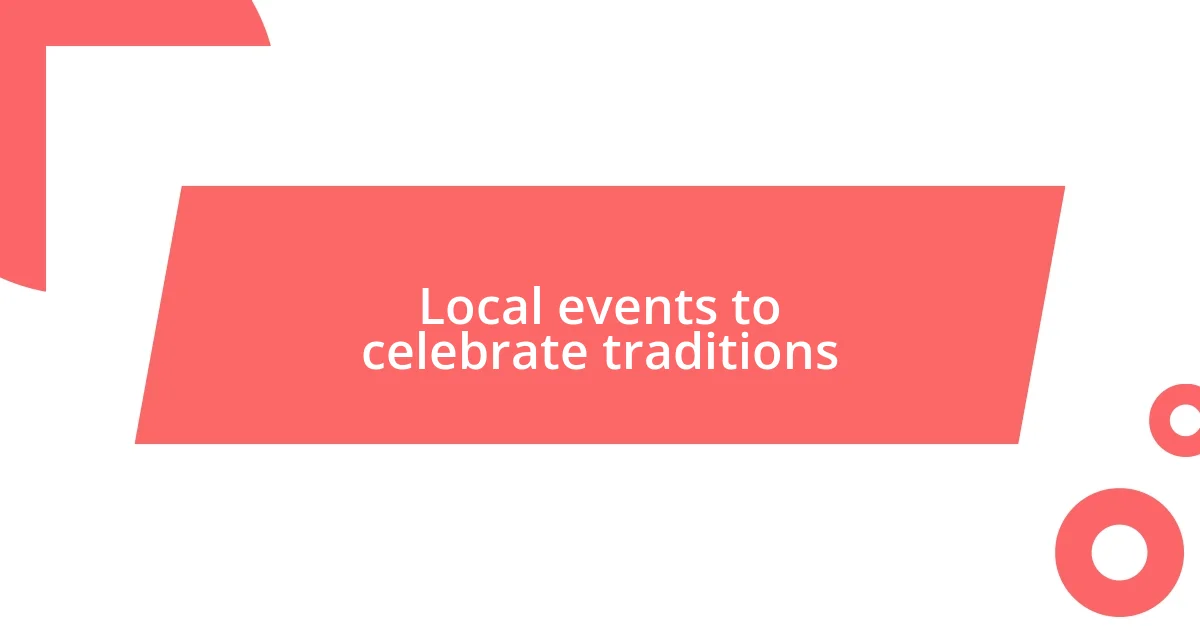
Local events to celebrate traditions
The local events celebrating our maritime traditions are a wondrous blend of culture and community. For instance, the annual Maritime Festival lights up the shore with lively music, food stalls featuring local seafood, and even boat races that bring thrilling competition. I recall laughing with friends as we cheered on our favorite boats, each participant representing a slice of our town’s spirit. It felt as if we were all part of a great, timeless ritual, affirming our ties to the ocean.
During the fishing heritage night, I was mesmerized by storytellers recounting tales of the sea that have been passed down through generations. The air was thick with emotion as we listened intently, feeling every wave and gust that the narrators described. This event not only honors our maritime history but also fosters a sense of understanding among different age groups, bridging the gap between the past and future. I remember the warmth of my grandparents’ hands in mine, their eyes brimming with nostalgia as they shared their own memories of chasing after the tide.
Another remarkable event is the coastal cleanup day, which, while focusing on preserving our marine environment, also serves to acknowledge our responsibility towards the ocean. I felt a profound connection to the land as I picked up litter alongside neighbors, fostering a strong bond through shared action. It’s amazing how participating in such events can redefine our relationship with the sea—transforming respect into actionable care for the life that flourishes beneath the waves.
| Event | Description |
|---|---|
| Maritime Festival | Celebrating local seafood, music, and boat races, fostering community spirit. |
| Fishing Heritage Night | A night filled with storytelling that connects generations through maritime tales. |
| Coastal Cleanup Day | Combining environmental responsibility with community bonding over preservation efforts. |
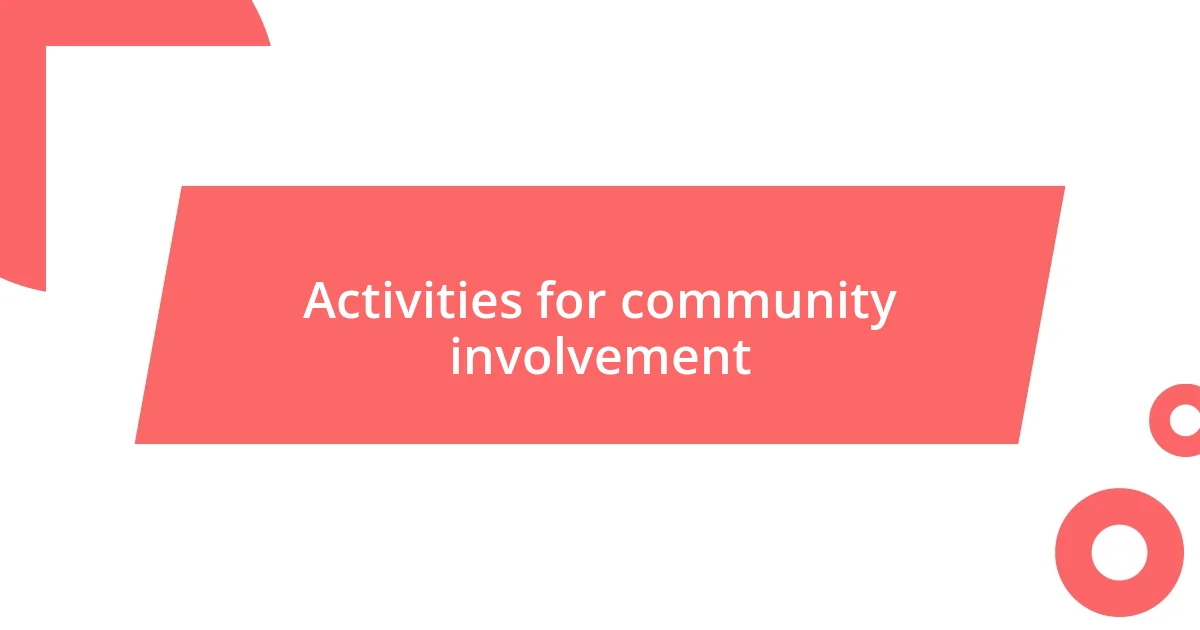
Activities for community involvement
One evening, our community came together for a lantern release on the beach, celebrating the maritime traditions that bind us. I remember standing in the sand, my heart filled with anticipation as each lantern illuminated the sky, carrying our hopes and dreams like messages to the sea. It’s moments like these that make you realize how such activities can transform mere gatherings into heartfelt expressions of unity and gratitude.
Another engaging activity involves local schools organizing boat-building workshops. I volunteered once, and I still smile at the sight of children bustling with excitement as they learned to craft their own miniature boats. The joy in their voices as they launched them into the water was infectious—it reminded me of my own childhood explorations, and it created a new generation’s appreciation for our maritime heritage. Isn’t it incredible how such simple activities can spark an enduring connection to our coastal identity?
Lastly, I cherish the evenings spent at community potlucks featuring seafood dishes passed down through generations. As I shared plates of clam chowder and fish stews, I listened to older residents recount their fishing stories, weaving threads through the fabric of our community’s history. Can you imagine being part of a conversation that not only fills your stomach but also nourishes your soul? These activities not only celebrate our maritime traditions; they anchor us, reminding us of our shared stories and the active role we play in preserving them for the future.
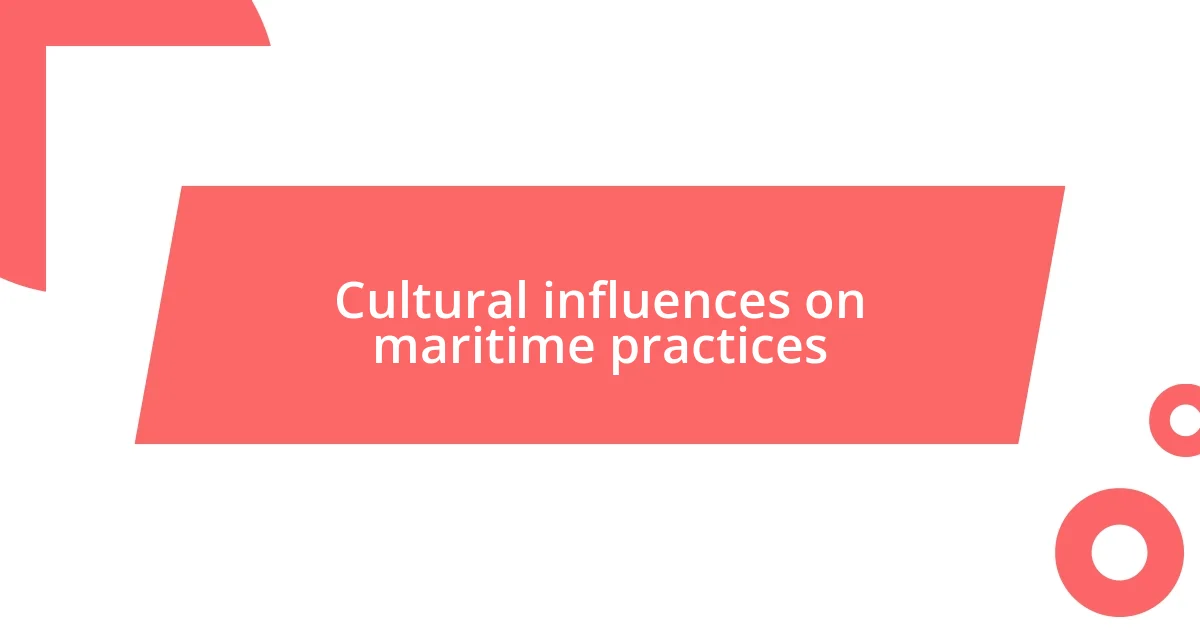
Cultural influences on maritime practices
Exploring the cultural influences on maritime practices in my town has been nothing short of fascinating. Growing up, I often heard tales from my elders about how different ethnic backgrounds contributed to our local maritime culture. It’s intriguing to think that every fish we catch and every dish we prepare tells a unique story, woven from the threads of our diverse ancestry. One summer, I attended a cooking class where we learned to make traditional seafood dishes from various cultures. Sharing those meals together created an unspoken bond as we celebrated our differences while savoring the same ocean’s bounty.
The art of navigation has also been shaped by cultural influences. I recall attending a workshop led by an experienced fisherman who introduced us to traditional wayfinding methods used by his ancestors. It was captivating to see how they relied on the stars and ocean currents to guide them. At that moment, I realized that this knowledge isn’t just practical—it’s also deeply spiritual. It connects us to our heritage and to each other, serving as a reminder that we are all part of something greater. Isn’t it fascinating how these ancient practices still resonate in our modern-day adventures on the water?
Additionally, festivals in our town are infused with cultural elements that celebrate our maritime legacy. I’ve watched in awe as dancers dressed in vibrant attire perform sea-inspired movements that tell stories of fishing and sea life. This not only entertains but also educates the audience about our townsfolk’s rich history in maritime trades. Each performance seems to resonate on a deeper level, making me wonder: How many more stories remain untold, waiting for someone to share them? I feel proud to be part of a community that values its maritime traditions, ensuring they remain alive for generations to come.
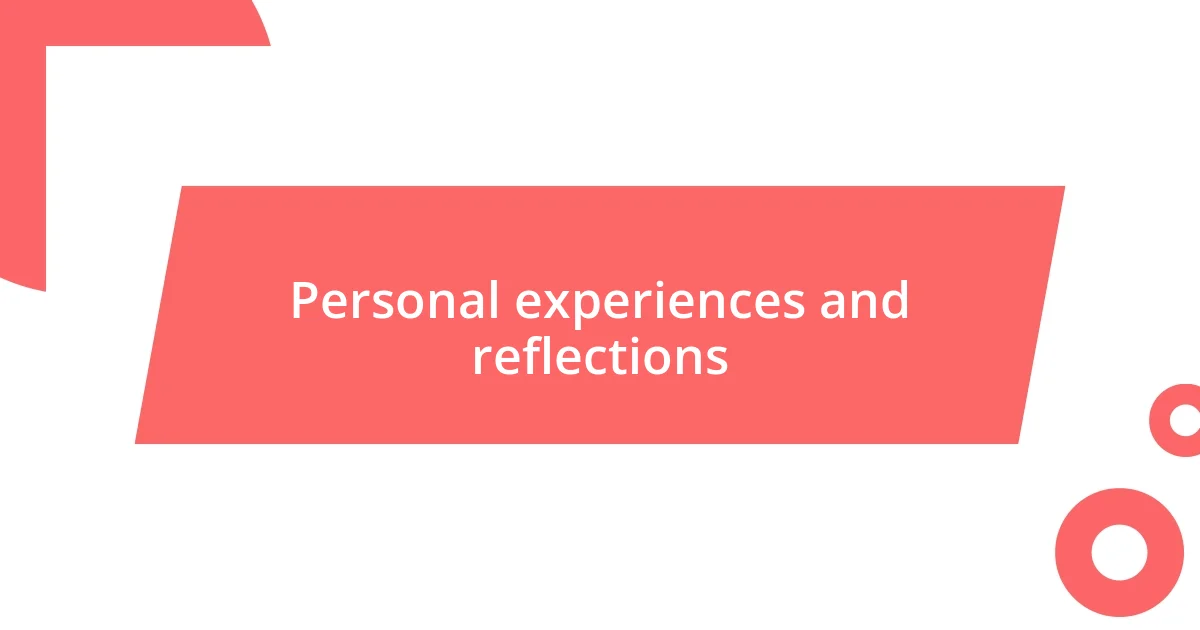
Personal experiences and reflections
Reflecting on my experiences with maritime traditions, I can’t help but smile when I think about the time I participated in a local regatta. It felt exhilarating to be part of a team, navigating through the waves while the sun glinted off the water’s surface. I vividly recall the camaraderie that developed as we worked together, cheering each other on. It was during that competition that I truly understood the essence of teamwork and the connection we have to the sea—it’s more than a body of water; it’s an integral part of our lives.
One of my fondest memories is visiting the annual fishing fair, where I found myself surrounded by families, laughter, and the unmistakable scent of fresh seafood. I still remember the warmth in my heart as I caught my first fish with my young cousin beside me, both of us gasping in delight as it flopped about on the dock. That simple act transformed into an impromptu lesson about patience, respect for nature, and the thrill of standing shoulder to shoulder with loved ones, sharing in meaningful traditions that echo through generations.
I also reflect on the storytelling sessions around bonfires during the summer. Sitting in a circle as the flames danced, older members of the community shared tales of maritime adventures and challenges. Each story was a lesson wrapped in laughter, nostalgia, or sometimes a bittersweet realization of loss. Who knew that listening to these narratives under a starlit sky would empower me to appreciate our coastal heritage on a deeper level? It’s these moments that illuminate the importance of preserving our maritime traditions, ensuring they remain a vibrant part of our communal identity.

